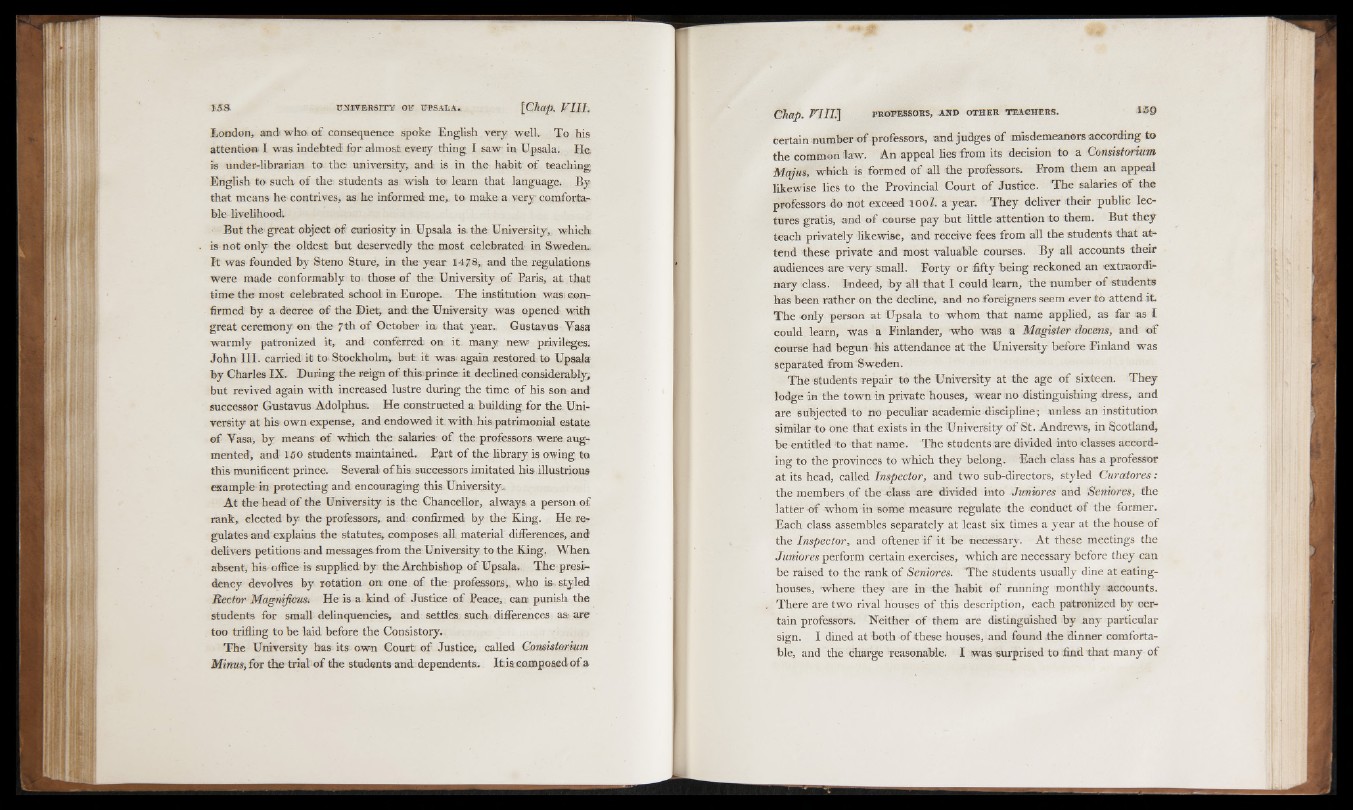
London, and« who. of consequence spoke English very well. To his
attention I was indebted for almost every thing I saw in Upsala. He.
is under-librarian to the university, and; is in the habit of teaching
English to such of the students as wish to’ learn that language. By
that means he contrives, as he informed me,, to make a very comfortable
livelihoods
But the. great object of curiosity in Upsala is the University,, which
is not only the oldest hut deservedly the most celebrated- in Sweden.,
It was founded by Steno Sture, in the year 1478; and the regulations
were made conformably to those of the University of Baris, at that
time the most celebrated school in Europe. The institution was; eon-r
firmed by a decree o f the Diet, and the University was opened- with
great ceremony on. the 7th of October in> that year. Gustavus Vasa
warmly patronized it, and conferred ou it many new privileges,
John III. carried it- to. Stockholm,, but it was again restored to Upsala
by Charles IX. During the reign of this prince it declined considerably,
but revived again with increased lustre during the time of his son and
successor Gustavus Adolphus; He constructed a building, for the. University
at his own expense, and endowed) it with his patrimonial estate
e f Vasa, by means of which the salaries o f the professors were augmented,
and 150 students maintained. Eart of the library is o;wing, to
this munificent prince. Several; o f his successors imitated his illustrious
example in protecting and encouraging this University,.
At the head of the University is the Chancellor, always a person, of
rank, elected by the professors, and confirmed by the King. He regulates
and explains the statutes; composes all material differences, and:
delivers petitions and messages from the University to the King. When
absent, his office is supplied by the Archbishop o f Upsala, The presidency
devolves by- rotation on one of the professors,, who is, styled
Hector Magmftcusi He is a kind of Justice o f Eeace, can punish, the
students for small delinquencies, and settles such differences as.- are
too trifling to be laid before the Consistory.
The University has its own Court of Justice, called Consistorium
Minus, for the trial of the students and dependents- Itia composed of a
Certain number o f professors, and judges o f misdemeanors according to
the common law. An appeal lies from its decision to a Consistorium
Majus, Which is formed of all the professors. From them an appeal
likewise lies to the Provincial Court o f Justice. The salaries of the
professors do not exceed 100L a year. They deliver their public lectures
gratis, and o f course pay but little attention to them. But they
teach privately likewise, and receive fees from all the students that attend
these private and most valuable courses. By all accounts their
audiences are very small. Forty or fifty bring reckoned an -extraordinary
class. Indeed, ;by all that I could learn, the number of students
has been rather on the decline, and n o foreigners seem ever to attend it.
The -only person at Upsala to whom that name applied, as far as I
could learn, was a Finlander, who was a Magister docens, and of
course had begun his attendance at the University before Finland was
separated from Sweden.
The students -repair to the University at the age o f sixteen. They
lodge in the town in private houses, wear no distinguishing dress, and
are subjected to no peculiar academic discipline; unless an institution,
similar to one that exists in the University of St. Andrews, in Scotland,
be entitled to that name. The students are divided into classes according
to the provinces to which they belong. Each class has a professor
at its head, called Inspector, and two sub-directors, styled Curatores:
the members o f the class are divided into Jtmiores and Seniores, the
latter-of whom in some measure regulate the conduct of the former.
Each class assembles separately at least six times a year at the house o f
the Inspector, and oftener i f it be necessary. At these meetings the
Juniores perform certain exercises, which are necessary before they can
be raised to the rank of Seniores. The students usually dine at eating-
houses, where they are in the habit o f running monthly accounts.
There are two rival houses o f this description, each patronized by certain
professors. Neither of them are distinguished by any particular
sign. I dined at both of these houses, and found the dinner comfortable,
and the charge reasonable. I was surprised to find that many o f